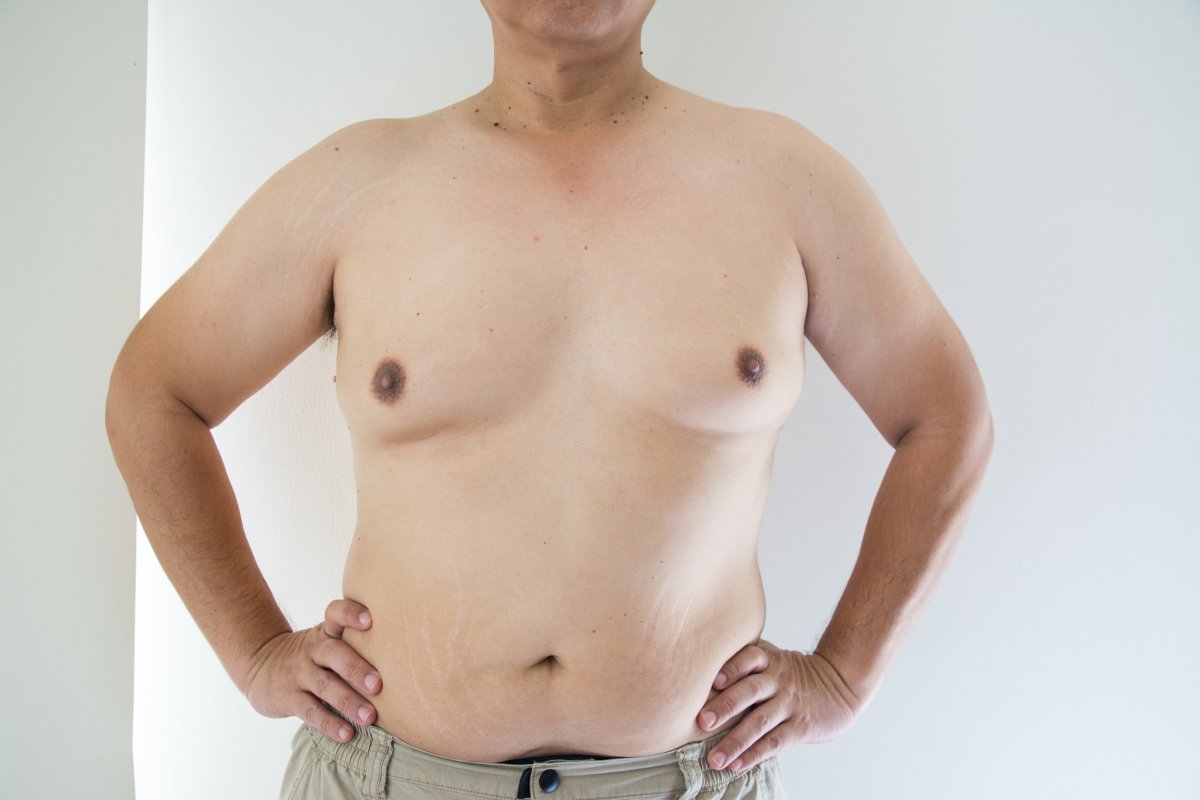Men with larger amounts of breast tissue may be more likely to die younger, research has found.
Men can have larger levels of breast tissue because of excess weight, known as pseudogynecomastia or "man boobs," or a hormonal condition formally called gynecomastia, which causes larger breasts outside of weight gain. Gynecomastia affects between 30 percent and 60 percent of men.
Gynecomastia may be related to a larger risk of dying before age 75, a new study published in the journal BMJ Open reveals. Those most vulnerable include men with a pre-existing risk factor, such as cancer or other diseases, before they get diagnosed with gynecomastia.
"Males diagnosed with gynecomastia are at higher risk of death, observed mainly in males with a known pre-existing risk factor of gynecomastia. These findings will hopefully stimulate more awareness among healthcare providers to potentially apply interventions that aid in alleviating underlying risk factors in males with this condition," the authors wrote in the paper.
Gynecomastia can develop at any age but is most commonly seen during periods of sex hormone change, such as puberty, shortly after birth, or in later life. As testosterone levels drop as men get older, gynecomastia can develop and be worsened by the weight gain that often occurs at the same time.

"Men as well as women produce sex steroids, i.e. testosterone (T), which is transformed to estradiol (E2). Thus, both sexes have both sex steroids in their circulation. Although men have 10-20 times higher T concentration compared to women, rendering the balance or ratio between T and E2 much higher in men," Anders Juul, study author and sex hormones expert at Copenhagen University Hospital - Rigshospitalet Juliane Marie Centre, told Newsweek.
"In puberty, both boys and girls start to grow breast tissue as estrogens start to surge around the body.
"This is why all girls develop breasts during puberty and why 50 percent of all adolescent boys develop breasts called 'physiological gynaecomastia' or 'pubertal gynaecomastia.' In boys, breast tissue regresses after 6-12 months once an equilibrium between estrogen and testosterone has been established in late puberty. If an adult man is exposed (for some reason) to higher E2 levels he may develop breast (gynaecomastia)," Juul said.
The researchers looked at data from 23,429 Danish men who had been diagnosed with gynecomastia between 1995 and 2021. The men were split into two groups: those with idiopathic gynecomastia, where the cause was unknown, and those with gynecomastia associated with a pre-existing condition or medication.
The analysis found that compared with randomly selected men without the condition, they had a 37 percent higher risk of early death. This risk factor was much higher for men with gynecomastia associated with another condition: this group was 75 percent more likely than healthy men to die early, while men with idiopathic gynecomastia were only 5 percent more likely to die early.
Of the conditions associated with gynecomastia, men with cancers saw an increased risk of 74 percent, while lung diseases and gut diseases were associated with a two-fold and five-fold increase in risk, respectively. Diseases of the liver, as well as disorders of the gallbladder, biliary tract and pancreas were all associated with greater risk.
The only way that men with idiopathic gynecomastia were more likely to die young than the reference group was via liver disease; their risk was doubled.

"We found increased risk of deaths from neoplasms (various cancer types) and risk of death from circulatory, pulmonary and gastrointestinal diseases were also statistically significant. Importantly, these higher death risks were observed among males with a known pre-existing risk factor for gynaecomastia, and death risks were increased up to fivefold in this group of males. Sometimes, we know how this works, in most cases we do not know," Juul explained.
"For example, a man with pre-existing cardiovascular disease may be diagnosed with gynecomastia if he is treated with spironolactone for his cardiovascular disease. Spironolactone is known to cause gynecomastia. Such a man may have an inherently higher risk of death cause of his cardiovascular problem compared to the background population.
"However, in most cases, we do not know the association between gynecomastia and increased risk of death. Thus, more research is needed to unravel these findings," he said.
The study did not touch on deaths from multiple outcomes nor whether the men had been exposed to hormone-altering substances and steroids, so more research on this is required. The authors hope that their findings can help focus more attention on the risks that men with gynecomastia face.
Do you have a tip on a science story that Newsweek should be covering? Do you have a question about male breasts? Let us know via science@newsweek.com.
Update 1/18/24, 12:122 p.m. ET: This article was updated with comment from Anders Juul.
Uncommon Knowledge
Newsweek is committed to challenging conventional wisdom and finding connections in the search for common ground.
Newsweek is committed to challenging conventional wisdom and finding connections in the search for common ground.
About the writer
Jess Thomson is a Newsweek Science Reporter based in London UK. Her focus is reporting on science, technology and healthcare. ... Read more





